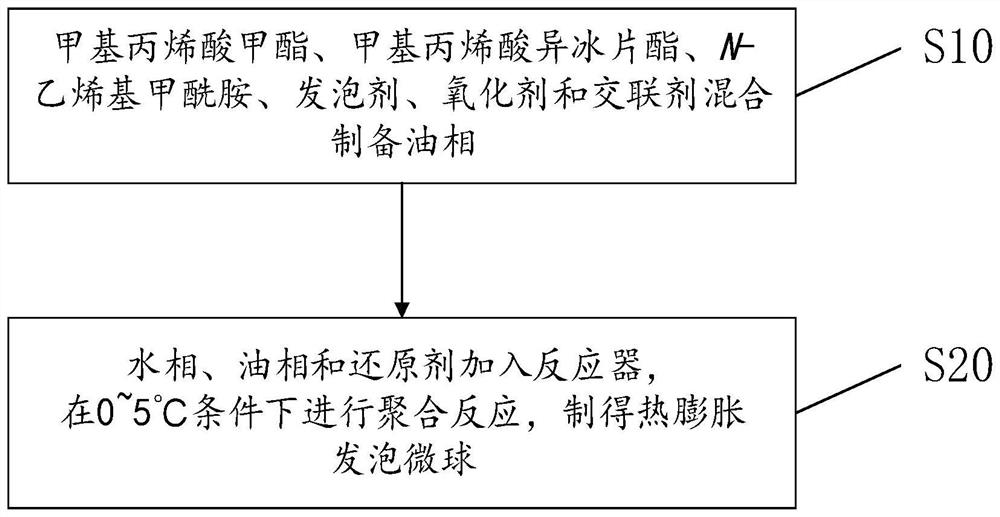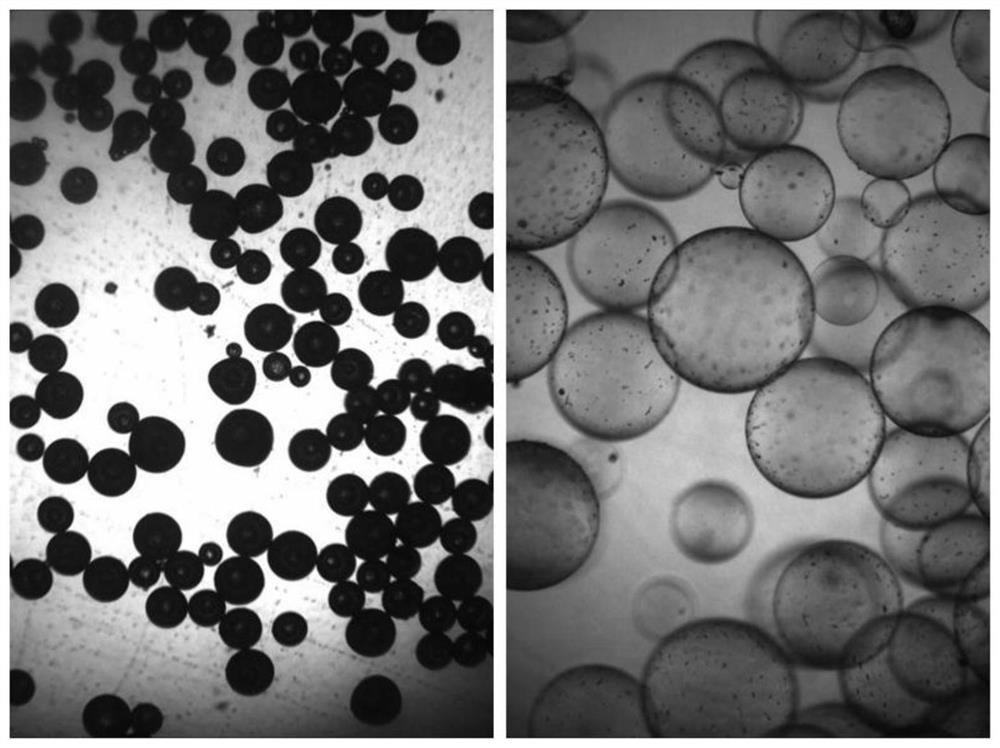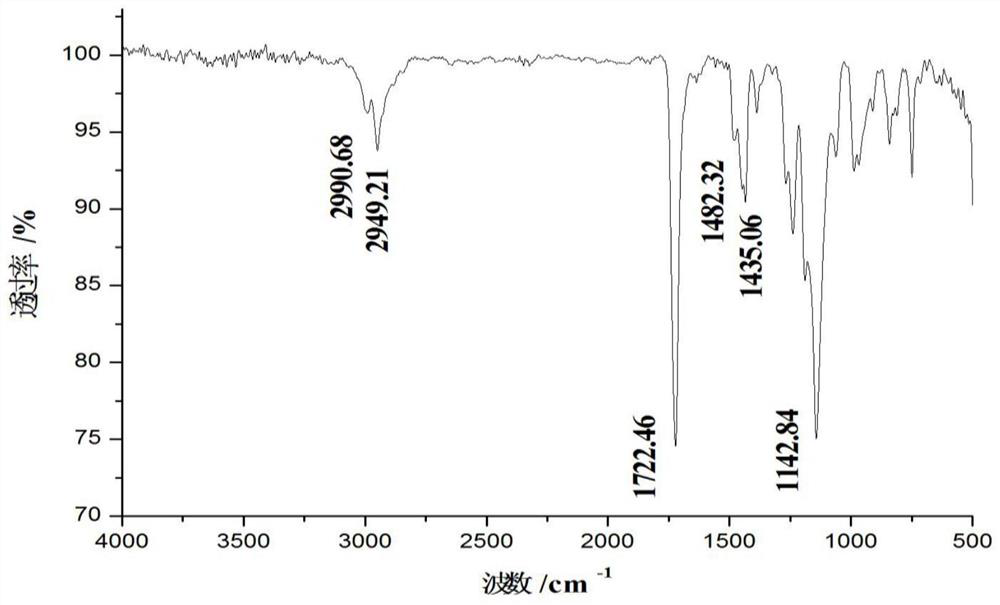A kind of acrylic resin thermal expansion foaming microsphere and preparation method thereof
An acrylic resin and foamed microsphere technology, applied in the field of polymer materials, can solve the problems of low safety factor, complicated process, hindering the large-scale industrial production of thermal expansion physical foamed microspheres, etc.
- Summary
- Abstract
- Description
- Claims
- Application Information
AI Technical Summary
Problems solved by technology
Method used
Image
Examples
preparation example Construction
[0030] Such as figure 1 As shown, the present invention proposes a method for preparing acrylic resin heat-expandable foamed microspheres, comprising the following steps:
[0031] S10, in parts by weight, 340-380 parts of methyl methacrylate, 10-60 parts of isobornyl methacrylate, 1-10 parts of N-vinyl formamide, 100-170 parts of foaming agent, 3 parts of oxidizing agent ~10 parts and 0.2~2 parts of crosslinking agent, mix evenly to make oil phase. In order to speed up the reaction process and prevent some low-boiling organic reagents from volatilizing, preferably, when configuring the oil phase, the above-mentioned components are mixed at the polymerization reaction temperature, that is, mixed at 0-5°C. More preferably, the mixing is at 0°C.
[0032] S20, in parts by weight, add 1,600 to 3,000 parts of the water phase into the reactor, then add the oil phase and 2 to 6 parts of the reducing agent into the reactor, stir at 0 to 5°C for polymerization, and obtain thermal expa...
Embodiment 1
[0047] Configure the oil phase: take 18g of methyl methacrylate, 2.5g of isobornyl methacrylate, 0.2g of N-vinylformamide, 7.4g of isopentane, and 0.04g of 1,3-butanediol dimethacrylate , 0.25g of dibenzoyl peroxide, mix evenly, blow nitrogen to remove oxygen for 5 minutes.
[0048] Configure the water phase: Take 120g of water and blow nitrogen to remove oxygen for 10 minutes.
[0049] Polymerization reaction: Vacuumize the reactor until the vacuum inside the reactor is less than 200Pa, then fill it with 1 atmosphere of nitrogen, and repeat the process of vacuuming and nitrogen filling three times. Under nitrogen protection, the water phase was added to the reactor, and then the oil phase and 0.14 g of N,N-dimethyl-p-toluidine were added. Turn on the stirring, control the rotation speed at 500 rpm, react at 0°C for 8 hours, raise the temperature to 5°C and react for 8 hours, then stop the reaction after the system naturally warms up to room temperature. The reaction product...
Embodiment 2
[0056] Configure the oil phase: take 18g of methyl methacrylate, 2g of isobornyl methacrylate, 0.1g of N-vinylformamide, 7.4g of isopentane, 0.04g of 1,3-butylene glycol dimethacrylate, 0.25 g of dibenzoyl peroxide, mixed evenly, and deoxygenated with nitrogen for 5 minutes.
[0057] Configure the water phase: add 0.5% polyvinyl alcohol and 5.0% sodium chloride by weight to 120 g of water, and blow nitrogen to remove oxygen for 10 minutes.
[0058] Polymerization reaction: Vacuumize the reactor until the vacuum inside the reactor is less than 200Pa, then fill it with 1 atmosphere of nitrogen, and repeat the process of vacuuming and nitrogen filling three times. Under nitrogen protection, the water phase was added to the reactor, and then the oil phase and 0.14 g of N,N-dimethyl-p-toluidine were added. Turn on the stirring, control the rotation speed to 400rpm, react at 0°C for 5 hours, raise the temperature to 5°C and react for 8 hours, then stop the reaction after the system...
PUM
| Property | Measurement | Unit |
|---|---|---|
| particle size | aaaaa | aaaaa |
| particle size | aaaaa | aaaaa |
| particle size | aaaaa | aaaaa |
Abstract
Description
Claims
Application Information
 Login to View More
Login to View More - R&D
- Intellectual Property
- Life Sciences
- Materials
- Tech Scout
- Unparalleled Data Quality
- Higher Quality Content
- 60% Fewer Hallucinations
Browse by: Latest US Patents, China's latest patents, Technical Efficacy Thesaurus, Application Domain, Technology Topic, Popular Technical Reports.
© 2025 PatSnap. All rights reserved.Legal|Privacy policy|Modern Slavery Act Transparency Statement|Sitemap|About US| Contact US: help@patsnap.com



